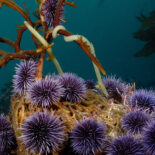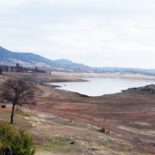
Ensia · Environmental Justice Policy Pollution Water
Nitrates on Tap
As contamination worsens, an oft-ignored groundwater pollutant is drawing new attention – and solutions.
Rethink · Climate Change Energy Water
Low-lying Vietnam Is Squeezed Between Its Neighbors and the Rising Seas.
Climate change, heavy-handed water management, and upstream dams are changing the Mekong Delta, pushing residents to adapt.

Hakai magazine · Climate Change Oceans
A Cull to Save the Kelp
An innovative project is rehabilitating California’s kelp forests after decades of degradation at the hands of environmental decay and sea urchin predation.

Ensia · Environmental Justice Policy Pollution Water
Our Drinking Water Systems Are a Disaster. What Can We Do?
In the wake of the Flint crisis, communities turn to innovative technology and financing to prevent the next crisis.

California’s Underground Water War
California has been the only western state without groundwater regulation – but now that looks set to change.

The Atlantic · Biodiversity Conservation
The Persian Leopard Is a Symbol of Persecution and Survival in the Middle East
In the Kurdish mountains of Iraq, conservationists are facing landmines and cultural taboos to save the endangered cat.

bioGraphic · Biodiversity Conservation Oceans
A Drop in the Ocean?
As the world’s marine ecosystems face ever-increasing threats, is the the trend toward huge, remote reserves a promising new development or a worrisome distraction?

Scientific American · Science Water
Do Dams Increase Water Use?
Reservoirs may promote waste by creating a false sense of water security.

Scientific American · Adaptation Nature-Based Solutions Slow Water Water
Ecological Detectives Hunt for San Francisco’s Vanished Waterways
Recovering “ghost creeks” from past landscapes can help protect the city’s
future amid climate chaos.

Scientific American · Biodiversity Biology Indigenous
What Lichens Can Teach Us
A new IMAX film highlights their beauty and resilience.

Nature · Energy Renewable Energy
Can Wind and Solar Fuel Africa’s Future?
With prices for renewables dropping, many countries in Africa might leap past dirty forms of energy towards a cleaner future.

Nature · Energy Renewable Energy
Lazarus Batteries
Battery recycling can be hard, energy intensive and uneconomic. But soon, dead power cells could be more easily resurrected.

Businesses Lead Where US Falters
The Paris Agreement requires commitments from countries to take action and reduce emissions, but the corporate world is also looking at its contribution to mitigation.

Scientific American · Biodiversity Science
What a Healthy Jungle Sounds Like
Species may have evolved their wide array of sounds to fill unused parts of the frequency spectrum. This could also reveal the degree of biodiversity in an ecosystem.


















